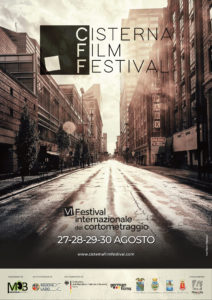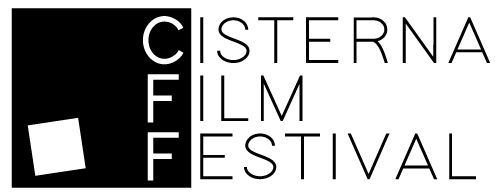Due to the Covid-19 epidemic that has affected the world, the “Cisterna Film Festival” has changed its dates: the appointment is at “Palazzo Caetani” from 27 to 30 August 2020, in accordance with the current regulations for the coronavirus emergency: limited seats and reservation required. In order to promote our work and the quality of our selection, we have also thought something completely new, which will take us out for a night. On Saturday 22 August, at 9 p.m. in the small square of “Sant’Oliva” in Cori, it will take place a pre-festival evening during which some of the most acclaimed short films from the previous editions will be screened.
 Finally, here it is: our new manifesto. As always, our aim is to give prestige to the excellences of our area. This year we have chosen the image of a local artist, the photographer Marco Mulattieri, born in 1982 in Cisterna di Latina, he lived in the USA for some time. Below, a brief interview to get to know him and his style better.
Finally, here it is: our new manifesto. As always, our aim is to give prestige to the excellences of our area. This year we have chosen the image of a local artist, the photographer Marco Mulattieri, born in 1982 in Cisterna di Latina, he lived in the USA for some time. Below, a brief interview to get to know him and his style better.
The photo chosen as the cover image of this Cff is very representative of the year we are living in, between distance and lockdown due both to the Covid-19, but actually it goes back to unsuspicious moments: what is the development of the photo, how was it born?
I don’t remember vividly the context of that photo; I think it was national holiday. I remember clearly the centre of the city where I lived completely empty. This was somewhat normal: Cincinnati without a beating heart and full of loneliness with a few signs of life here and there. When Covid arrived, social distancing was nothing new; it was the everyday life, outside at least. When I took this photo, I didn’t even notice the emptiness, because I was probably used to it. But now, staring at it, it strikes me too!
You spent a long time in the USA: how did this affect your style and training?
Staying in the USA has had a positive impact in both pragmatism and organisation. The Americans from the Midwest – where I lived – are practical, concrete people. You get friends according to your interests, not because you go to the same school or because you live in the same neighbourhood. So, in my group of friends, all photographers and videographers, we used to talk about photography, organize outings, shootings, and so on. The negative aspect was the lack of creativity: we all were copying someone else, but nobody was trying to find new ideas. I spent four years realizing that doing what everyone else was doing, I would be exactly the same as everyone else.
How did you get to photography? What is your relationship with cinema?
I use photography to remember people I meet and moods I feel. It’s a pity that I have a few photos of my first thirty years because I feel I’m missing pieces of my past experiences. However, since I’ve become a photographer, I’m more present to myself and to the others. Now I feel complete and authentic. Even if the camera would be seen as a barrier against the world, for me it’s a doorway.
The answer is more complicated about cinema: from an aesthetic point of view, I look at photography a lot, I try to “steal with my eyes”, to take inspiration. From the point of view of the subject I look very much at the psychological depth of the characters, the narrative-organic development, and the attention to detail. So that’s why I prefer TV series, because screenwriters have more “time” to build their characters. Differently from reading a book, that is very difficult for me, I literally can’t get enough of watching movies or TV series. But I feel that my film culture is still relatively poor, and too mainstream, and I really want to go into it!
You have dedicated a lot to portraits, and in many of them there is a “taste of the past” due to the choice of light and the predominant colours of the picture. Is it a way of giving your photos “timelessness”?
The slightly vintage aspect of my photos is due to that sense of authenticity that made me start shooting. I have no problem in retouching my photos, sometimes even heavily, but at the end of the process, I want the image to appear spontaneous, simple, true. Maybe because I belong to the generation who grew up with film cameras, before Photoshop and the other devices we use today convinced us that the digital future would be better. The term “photo shopped” popularly means “false” and it’s really a shame. Actually, I like that people look at my photos and capture the same simplicity and beauty that I saw when I was taking the photo, thinking something like “come on, you can trust me!”
